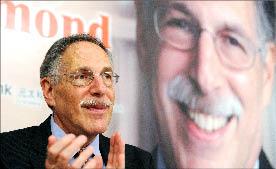The unemployment rate has become the most urgent issue threatening the US economy, even though the nation still has other internal and external issues to watch, such as its own debt problem, the eurozone debt crisis and the state of the economy in China, Nobel Prize in Economics laureate Peter Diamond said in Taipei yesterday.
Diamond, who is scheduled to deliver lectures on a possible future global economic crisis and national debt in the US and Europe today and tomorrow, said what the US government should focus on more should be the unemployment issue, instead of its debt problem, which might require more time to improve, step by step.
“It seems to me that the US has an unemployment crisis and a debt problem, yet [decisionmakers] see it as a debt crisis and an unemployment problem,” Diamond told a press conference, adding that the longer it takes to solve the unemployment issue, the worse the economy would become.

Photo: CNA
GOOD TIME
Diamond said it is certainly a good time for the US to expand its public spending by building more infrastructure, drawing on resources like workers sitting idle and so help lowering the national jobless rate.
In addition, he said, the US government should increase taxes on the wealthy, because its emergency measure of expanding public spending would deepen the its financial burden.
TAX THE RICH
Although there is opposition to increasing taxes on the rich, it remains an appropriate measure to improve the wellbeing of society, Diamond said.
“No matter whom it takes from, the government needs to raise resources for supporting infrastructure and people in need,” Diamond said, adding that expanding the infrastructure would enhance the efficiency of the nation’s economy.
“It is not a problem of ‘is it harmful to do this?’ It is a problem of ‘is it more harmful to take the resources from high earners or from other people with lower earnings?’” Diamond said.
As for the US debt issue, Diamond said it was a manageable problem that the government has more time to solve, rather than an immediate crisis.
However, if the government cannot solve the problem in an appropriate manner, the debt issue would become a crisis within two decades, he added.
Diamond said the debt crisis in the eurozone, which must be solved immediately, was also a key issue that the US should watch, but the crisis may lead to a recession only in Europe, based on his knowledge thus far.
CHINA
The state of the economy in China is another aspect that global economies should carefully observe, because a global recession might occur if China’s inflation or liquidity problem deteriorate in the future, he added.
Diamond, 71, shared last year’s Nobel Prize in Economics with Dale Mortensen of Northwestern University and Christopher Pissarides of the London School of Economics.
He is a professor at the Massachusetts Institute of Technology.

A proposed 100 percent tariff on chip imports announced by US President Donald Trump could shift more of Taiwan’s semiconductor production overseas, a Taiwan Institute of Economic Research (TIER) researcher said yesterday. Trump’s tariff policy will accelerate the global semiconductor industry’s pace to establish roots in the US, leading to higher supply chain costs and ultimately raising prices of consumer electronics and creating uncertainty for future market demand, Arisa Liu (劉佩真) at the institute’s Taiwan Industry Economics Database said in a telephone interview. Trump’s move signals his intention to "restore the glory of the US semiconductor industry," Liu noted, saying that

STILL UNCLEAR: Several aspects of the policy still need to be clarified, such as whether the exemptions would expand to related products, PwC Taiwan warned The TAIEX surged yesterday, led by gains in Taiwan Semiconductor Manufacturing Co (TSMC, 台積電), after US President Donald Trump announced a sweeping 100 percent tariff on imported semiconductors — while exempting companies operating or building plants in the US, which includes TSMC. The benchmark index jumped 556.41 points, or 2.37 percent, to close at 24,003.77, breaching the 24,000-point level and hitting its highest close this year, Taiwan Stock Exchange (TWSE) data showed. TSMC rose NT$55, or 4.89 percent, to close at a record NT$1,180, as the company is already investing heavily in a multibillion-dollar plant in Arizona that led investors to assume

AI: Softbank’s stake increases in Nvidia and TSMC reflect Masayoshi Son’s effort to gain a foothold in key nodes of the AI value chain, from chip design to data infrastructure Softbank Group Corp is building up stakes in Nvidia Corp and Taiwan Semiconductor Manufacturing Co (TSMC, 台積電), the latest reflection of founder Masayoshi Son’s focus on the tools and hardware underpinning artificial intelligence (AI). The Japanese technology investor raised its stake in Nvidia to about US$3 billion by the end of March, up from US$1 billion in the prior quarter, regulatory filings showed. It bought about US$330 million worth of TSMC shares and US$170 million in Oracle Corp, they showed. Softbank’s signature Vision Fund has also monetized almost US$2 billion of public and private assets in the first half of this year,

On Ireland’s blustery western seaboard, researchers are gleefully flying giant kites — not for fun, but in the hope of generating renewable electricity and sparking a “revolution” in wind energy. “We use a kite to capture the wind and a generator at the bottom of it that captures the power,” said Padraic Doherty of Kitepower, the Dutch firm behind the venture. At its test site in operation since September 2023 near the small town of Bangor Erris, the team transports the vast 60-square-meter kite from a hangar across the lunar-like bogland to a generator. The kite is then attached by a